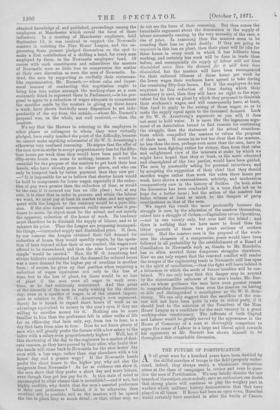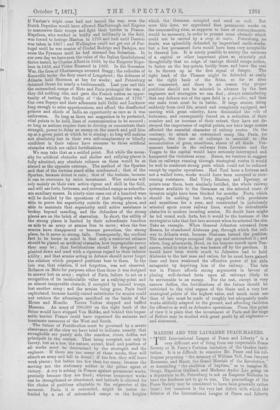THE FUTURE OF FORTIFICATION.
AS all groat wars for a hundred years have been decided by the skilful marches of troops in the field (properly under- stood, indeed, they always were), a wholesome disposition arises at the close of campaigns to review and even to ques- tion the uses of Fortification. We may briefly dismiss the last branch of the subject, since nobody, save an enthusiast, can doubt that strong places will continue to play the weighty part in warfare which military history demonstrates that they have played in all times. If Rome had been an open town, Hannibal would certainly have marched in after the battle of Canine.
If Vauban's triple zone had not barred the way, even the Dutch Deputies would have allowed Marlborough and Eugene
to manoeuvre their troops and fight their battles in France. Napoleon, who worked so boldly and brilliantly in the field, was forced to besiege Mantua in 1796 and halt until Dantric was taken in 1807; and Wellington could not get out of Por- tugal until he was master of Ciudad Rodrigo and Badajos, nor cross the Pyrenees until he had stormed San Sebastian. In our own day we have seen the value of the Italian Quadrilateral thrice tested, by Charles Albert in 1848, by the Emperor Napo- leon in 1859, and Victor Emanuel in 1866. In the Secession War, the lines of Chattanooga arrested Bragg ; the redoubts of Knoxville broke the fiery onset of Longstreet ; the defences of Atlanta held Sherman at bay for weeks and Petersburg detained Grant for nearly a twelvemonth. Last year and this the entrenched camps of Metz and Paris prolonged the war, if they did nothing else, and gave the French nation an oppor- tunity of testing the frailty of "the traditions of 1792." Our own Sepoys and their adherents held Delhi and Lucknow long enough to raise apprehensions, and afford the disaffected princes and chiefs of India an opportunity as rare as it was unforeseen. So long as there are magazines to be protected, vital points to be held, lines of communication to be secured ; so long as nations require time to develop or concentrate their strength, power to delay an enemy on the march and pull him up at a given point at which he is aiming ; so long will nations not absolutely lost in their own self-complacency or blindly confident in their valour have recourse to those artificial obstacles which are called fortifications.
We may take that as a settled point. But while the neces- sity for artificial obstacles and shelter and rallying-places is fully admitted, any absolute reliance on them would be as absurd as the opposite extreme. The method of the Spartan and that of the tortoise stand alike condemned ; that of the Spartan, because defeat is ruin ; that of the tortoise, because it can be overcome by strict investment. Wise nations will rely mainly on their own active vigour and skill in the field, and will use forts, fortresses, and entrenched camps as subordin- ate auxiliary means. In ninety-nine cases out of a hundred wars will be decided by the operations of that belligerent who is able to prove his superiority outside the strong places, and able to maintain that superiority until active assistance is broken beyond mending, and the defenders of the strong placer; are on the brink of starvation. In short, the utility of the strong places is limited by their subordinate function as aids to an army or armies free to move ; when the free armies have disappeared or become powerless, the strong place, be it never so strong, falls. Consequently, the cardinal fact to be borne in mind is that only a restricted reliance should be placed on artificial obstacles, how impregnable soever they may be ; that fortifications should be designed and planted down and used with a rigorous regard to their inferior utility; and that armies acting in defence should never forget the relation which prepared positions bear to them. In the late war, that relation, if not forgotten, was not observed. Reliance on Metz for purposes other than those it was designed to answer lost an army ; neglect of Paris, failure to act on a recognition of its incalculable value as a rallying-point and an almost insuperable obstacle, if occupied by trained troops, lost another army ; and the armies being gone, Paris itself capitulated, because hastily-raised substitutes for armies could not retrieve the advantages sacrificed on the banks of the Meuse and Moselle. Torres Vedras stopped and baffled Massena. An army of 200,000 on the right bank of the Seine would have stopped Von Moltke, and behind this impas- sable barrier France could have organized the animate and inanimate resources of the West and South.
The future of Fortification must be governed by a severe observance of the view we have tried to indicate, namely, that strongholds are purely aids, like marshes, rivers, defiles, not principals in the contest. That being accepted, not only in theory, but as a law, the nature, extent, kind, and position of all works must be determined by the strategist and the engineer. If there are too many of these works, they will absorb an army and fall in detail ; if too few, they will leave weak places ; but better too few than too many, because the moving not the stationary soldier is the prime agent of victory. A cry is arising in France against permanent works, precisely because they are fixed ; whereas temporary works can be strengthened or abandoned, and latitude is allowed for the choice of positions adaptable to the exigencies of the moment. Paris, it is contended, might be better de- fended by a set of entrenched camps on the heights
which the Germans occupied and used so well. But were this done, we apprehend that permanent works on the commanding sites, as supports to lines of entrenchments, would be necessary, in order to present B01110 obstacle which could not be carried by a coup de main. Petersburg, no doubt, was splendidly defended by improvised earth-works, but a few permanent forts would have been very acceptable to General Lee. It is surely possible to survey the environs of a capital or other important place so minutely and thoughtfully that no coign of vantage should escape notice, to fasten on the key-points, fortify these, and leave the rest
to be thrown up at the first signal of danger. The right bank of the Thames might be defended as easily as the right bank of the Seine, so far as sites
are concerned, and there is no reason why proper- positions should not be selected in advance by the best
engineers and strategists we can find ; always remembering
that any defence out of the open field is a pis-allcr, and that our main trust must be in battle. If large armies, rising
suddenly from civil life, armed and completely equipped, and
moving with great celerity, have diminished the ride of fortresses, and consequently forced on a reduction of their
number and an increase of their extent, they have not de- stroyed the importance of capital points, nor have large armies affected the essential character of railway routes. On the contrary, to attack an entrenched camp like Paris, for example, the free use of railways is essential to the accumulation of guns, munitions, stores of all kinds. Per- manent breaks in the railways from Lorraine and the Vosges to the capital would have seriously interrupted and hampered the victorious army. Hence, we venture to suggest
that on railways running through strategical routes it would be well to construct strong posts which could not be reduced except by regular operations. Had Toni been a fortress and not a walled town, weeks would have been occupied in over- coming resistance. Had Vitry, Rheims, and Epernay, or points near them, been similarly fortified, the whole railway systems available to the Germans on the selected route of, invasion might have been blocked for months. Forts, which should be nothing but forts, supplied with provisions, and munitions for a year, and constructed in judiciously selected spots across railway lines, would be redoubtable obstacles to modern invading armies. No doubt lines might
be led round such forts, but it would be the business of the strategist to take that fact into account when he selected the site.
Take an example. When General Johnston retreated from Renck he abandoned Alatoona gap, through which the rail- way to Atlanta went, because Sherman turned the position. The national troops occupied the gap and entrenched it ; and when, long afterwards, Hood, on his famous march upon Ten- nessee, tried to seize it, he was beaten off by the garrison. It
would have been worth much to Johnston had he held
Alatoona to the last man and ration, for he must have gained time and have weakened the offensive power of his able antagonist by depriving him of the railway. The late war in France affords strong arguments in favour of placing well-devised forts upon all railways likely to. be serviceable to an enemy. For the rest, except in very narrow defiles, the fortifications of the future should be restricted to the vital organs of the State and a very few strategical points of the highest value, and much more uses than of late must be made of roughly but adequately made works skilfully adapted to the ground, and affording facilities for offensive as well as defensive operations. From this point of view it is plain that the investment of Paris and the siege of Belfort may be studied with great profit by all engineers— and statesmen.



































 Previous page
Previous page